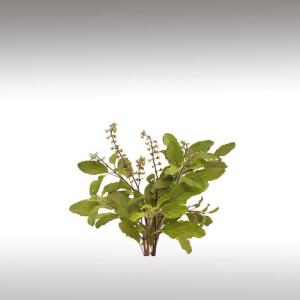
HOLY BASIL ESSENTIAL OIL (OCIMUM SANCTUM) - ESSENTIAL OILS

BASE / GENERAL DATA
Information submited: May 4, 2014 Modified: March 13, 2018 By: OperaDreamhouse
Botanical Name: Ocimum sanctum
Common Method of Extraction: Steam Distilled
Part Typically Used: Leaves and Flowers/Buds
Color: Pale Yellow
Consistency: Thin
Perfumery Note: Top
Strength of Initial Aroma: Strong, warming and spicy.
Ocimum Tenuiflorum, also known as Ocimum Sanctum, Holy Basil, or Tulasī, is an aromatic plant in the family Lamiaceae which is native to the Indian Subcontinent and widespread as a cultivated plant throughout the Southeast Asian tropics.

SPIRITUAL PRACTISES DATA
Information submited: July 9, 2014 Modified: March 13, 2018 By: OperaDreamhouse
It is an extremely sacred plant in India and Hinduism, hence why it is called Holy Basil. Tulasi, which is Sanskrit for "The incomparable one", is most often regarded as a consort of Krishna in the form of Lakshmi.
Tulsi has played a large role in the Hindu religion for thousands of years, as it is worshiped as the avatar of the goddess Lakshmi, who represents wealth and is the wife of Vishnu.
The Hindus also believe that tulsi is an expression of Sita, whom is also an avatar of Lakshmi and is considered an example of wifely and womanly virtues for Hindu women.
Hindus grow tulsi plants in the center of their courtyards, near their homes, and Hindu temples. Many Hindu healers would use Tulsi as a medicinal herb, as it would often be used for healing the sick and would be given to the dying in order to raise their departing souls to heaven.
According to Vaishnavas, it is believed in Puranas that during Samudra Manthana when the gods win the ocean-churning against asuras, Dhanvantari comes up from the ocean with Amrita in hand for the gods. Dhanvantari (The divine medico) sheds happy tears and when the first drop falls in Amrita it forms Tulasi. In the ceremony of Tulasi Vivaha, Tulasi is ceremonially married to Krishna annually on the eleventh day of the waxing moon or twelfth of the month of Kartika in the lunar calendar. This day also marks the end of the four-month Cāturmāsya period, which is considered inauspicious for weddings and other rituals, so the day inaugurates the annual marriage season in India. The ritual lighting of lamps each evening during Kartika includes the worship of the Tulasi plant, which is held to be auspicious for the home. Vaishnavas especially follow the daily worship of tulasi during Kartika.
Tulasi leaves is an essential part in the worship of God Vishnu (Narayana) and his Avatars including God Krishna, God Rama and other male Vaishnava deities like Hanuman, Balarama, Garuda and many others.
Tulsi's protective qualities purify environments, while uplifting the mind, body, and spirit. Tulsi essential oil also has many harmony balancing characteristics, which produce virtue and joy in humans, allowing ultimate shining of the spirit's light.
This Basil is considered a sacred herb in India, where it has been planted around doorways to banish evil spirits. In various parts of the Orient it is planted around temples, and used in prayer beads.
Used for meditation:
Third Chakra - Solar Plexus: The Solar Plexus Chakra is located in the center of the belly and governs the physical functions of the stomach. Tulsi helps to regulate metabolism and digestion.
Fourth Chakra - Heart: Tulsi is able to open the heart to love and compassion, while strengthening faith and clarity throughout the Heart Chakra.
Fifth Chakra - Throat: Tulsi allows us to be in tune with our inner self and inner truth. The oil also transforms mental concepts of doubt and distrust, allowing for clear decision making made through the Throat Chakra. Physically, Tulsi assists with oral health of the teeth and gums and bacteria in the mouth.
Sixth Chakra - Third Eye: Tulsi provides ultimate spiritual cleansing throughout the body allowing for clarity and awareness to be present in the Third Eye Chakra. Tulsi also provides perspective to one's mind and spirit.
Seventh Chakra - Crown: Tulsi provides mental clarity and instills mental ease. The oil also purifies the air, mind, body, and spirit, creating a cleared personal haven where one can relax, breath, and meditate.
Basil raises vibrations, realigns subtle energies and stimulates clairaudience and spiritual connection, including the call to service and selfless or humanitarian pursuits. On the physical level, basil addresses hysteria, indecision and feelings of vulnerability or lack of control.
Tulsi has played a large role in the Hindu religion for thousands of years, as it is worshiped as the avatar of the goddess Lakshmi, who represents wealth and is the wife of Vishnu.
The Hindus also believe that tulsi is an expression of Sita, whom is also an avatar of Lakshmi and is considered an example of wifely and womanly virtues for Hindu women.
Hindus grow tulsi plants in the center of their courtyards, near their homes, and Hindu temples. Many Hindu healers would use Tulsi as a medicinal herb, as it would often be used for healing the sick and would be given to the dying in order to raise their departing souls to heaven.
According to Vaishnavas, it is believed in Puranas that during Samudra Manthana when the gods win the ocean-churning against asuras, Dhanvantari comes up from the ocean with Amrita in hand for the gods. Dhanvantari (The divine medico) sheds happy tears and when the first drop falls in Amrita it forms Tulasi. In the ceremony of Tulasi Vivaha, Tulasi is ceremonially married to Krishna annually on the eleventh day of the waxing moon or twelfth of the month of Kartika in the lunar calendar. This day also marks the end of the four-month Cāturmāsya period, which is considered inauspicious for weddings and other rituals, so the day inaugurates the annual marriage season in India. The ritual lighting of lamps each evening during Kartika includes the worship of the Tulasi plant, which is held to be auspicious for the home. Vaishnavas especially follow the daily worship of tulasi during Kartika.
Tulasi leaves is an essential part in the worship of God Vishnu (Narayana) and his Avatars including God Krishna, God Rama and other male Vaishnava deities like Hanuman, Balarama, Garuda and many others.
Tulsi's protective qualities purify environments, while uplifting the mind, body, and spirit. Tulsi essential oil also has many harmony balancing characteristics, which produce virtue and joy in humans, allowing ultimate shining of the spirit's light.
This Basil is considered a sacred herb in India, where it has been planted around doorways to banish evil spirits. In various parts of the Orient it is planted around temples, and used in prayer beads.
Used for meditation:
Third Chakra - Solar Plexus: The Solar Plexus Chakra is located in the center of the belly and governs the physical functions of the stomach. Tulsi helps to regulate metabolism and digestion.
Fourth Chakra - Heart: Tulsi is able to open the heart to love and compassion, while strengthening faith and clarity throughout the Heart Chakra.
Fifth Chakra - Throat: Tulsi allows us to be in tune with our inner self and inner truth. The oil also transforms mental concepts of doubt and distrust, allowing for clear decision making made through the Throat Chakra. Physically, Tulsi assists with oral health of the teeth and gums and bacteria in the mouth.
Sixth Chakra - Third Eye: Tulsi provides ultimate spiritual cleansing throughout the body allowing for clarity and awareness to be present in the Third Eye Chakra. Tulsi also provides perspective to one's mind and spirit.
Seventh Chakra - Crown: Tulsi provides mental clarity and instills mental ease. The oil also purifies the air, mind, body, and spirit, creating a cleared personal haven where one can relax, breath, and meditate.
Basil raises vibrations, realigns subtle energies and stimulates clairaudience and spiritual connection, including the call to service and selfless or humanitarian pursuits. On the physical level, basil addresses hysteria, indecision and feelings of vulnerability or lack of control.

MEDICINE / HEALTH DATA
Information submited: July 9, 2014 Modified: March 13, 2018 By: OperaDreamhouse
Tulsi is one of the most powerful and effective stress reducers. Ocimum Sanctum is known as an adaptogen, an agent that helps one adapt more efficiently to stress by reducing the intensity and impact of stress caused by disease, infection, emotional imbalance, and mental tension.
Some sources indicate that it can be useful in relieving the pain of peripheral neuropathy and arthritis and other joint diseases
Tulsi oil is used to avoid damage factors include injury, aging, and anxiety. Stress has been proven by Western science to be the leading cause of aging and disease. Tulsi supports overall well-being, enhances stamina, and stimulates energy.
Tulsi has been proven to protect the body from radiation poisoning and catarcts, as it is an anti-oxidant and can repair cells damaged by exposure to radiation.
Tulsi essential oil also supports the immune system, promotes healthy metabolism, helps with digestion and gastrointestinal issues, also neutralizes dangerous biochemicals that contribute to cancer, degenerative disease.
Tulsi contains Vitamin C and eugonal, which contributes to lowering blood pressure and detoxifying the body, and if used regularly will prevent heart attacks and greatly reduces free radical damage.
Jeanne Rose (Director of the Institute of Aromatic Studies) indicates that it may have hormonal like action on the prostate gland.
Ocimum Sanctum is very good for eye diseases, insect bites and so on.
Ayurveda Studies:
Used extensively in India and within Ayurvedic practices.
Tulasi (Sanskrit - Surasa) has been used for thousands of years in Ayurveda for its diverse healing properties. It is mentioned in the Charaka Samhita, an ancient Ayurvedic text.
Tulsi is considered to be an adaptogen, balancing different processes in the body, and helpful for adapting to stress. Marked by its strong aroma and astringent taste, it is regarded in Ayurveda as a kind of "Elixir of life" and believed to promote longevity.
Some sources indicate that it can be useful in relieving the pain of peripheral neuropathy and arthritis and other joint diseases
Tulsi oil is used to avoid damage factors include injury, aging, and anxiety. Stress has been proven by Western science to be the leading cause of aging and disease. Tulsi supports overall well-being, enhances stamina, and stimulates energy.
Tulsi has been proven to protect the body from radiation poisoning and catarcts, as it is an anti-oxidant and can repair cells damaged by exposure to radiation.
Tulsi essential oil also supports the immune system, promotes healthy metabolism, helps with digestion and gastrointestinal issues, also neutralizes dangerous biochemicals that contribute to cancer, degenerative disease.
Tulsi contains Vitamin C and eugonal, which contributes to lowering blood pressure and detoxifying the body, and if used regularly will prevent heart attacks and greatly reduces free radical damage.
Jeanne Rose (Director of the Institute of Aromatic Studies) indicates that it may have hormonal like action on the prostate gland.
Ocimum Sanctum is very good for eye diseases, insect bites and so on.
Ayurveda Studies:
Used extensively in India and within Ayurvedic practices.
Tulasi (Sanskrit - Surasa) has been used for thousands of years in Ayurveda for its diverse healing properties. It is mentioned in the Charaka Samhita, an ancient Ayurvedic text.
Tulsi is considered to be an adaptogen, balancing different processes in the body, and helpful for adapting to stress. Marked by its strong aroma and astringent taste, it is regarded in Ayurveda as a kind of "Elixir of life" and believed to promote longevity.

BEAUTY / COSMETICS DATA
Information submited: July 9, 2014 Modified: March 13, 2018 By: OperaDreamhouse
Ocimum Sanctum essential oil is highly anti-biotic, disinfectant, and anti-bacterial. Tulsi contains the chemical component of camphene, a bicyclic monoterpene, which causes a sensational cooling affect when applied to the face.
Tulsi essentiao oil can also be used as a daily mouthwash, as it kills 99 percent of germs and bacteria in the mouth.
Tulsi essentiao oil can also be used as a daily mouthwash, as it kills 99 percent of germs and bacteria in the mouth.

FOOD / COOKING DATA
Information submited: July 9, 2014 Modified: March 13, 2018 By: OperaDreamhouse
Tulasi is cultivated for religious and medicinal purposes, and for its essential oil. It is widely known across the Indian Subcontinent as a medicinal plant and an herbal tea, commonly used in Ayurveda, and has an important role within the Vaishnavite tradition of Hinduism, in which devotees perform worship involving Holy Basil plants or leaves.
Tulsi is native throughout the world tropics and widespread as a cultivated plant and an escaped weed.
This essential oil contains vitamin C and A, and minerals like calcium, zinc and iron, as well as chlorophyll and many other phytonutrients.
Tulsi is native throughout the world tropics and widespread as a cultivated plant and an escaped weed.
This essential oil contains vitamin C and A, and minerals like calcium, zinc and iron, as well as chlorophyll and many other phytonutrients.
COMMENTS
No comments.
Newest mixtures containing Holy Basil Essential Oil (Ocimum Sanctum):

Skin healing balm for winter season
February 23, 2015


